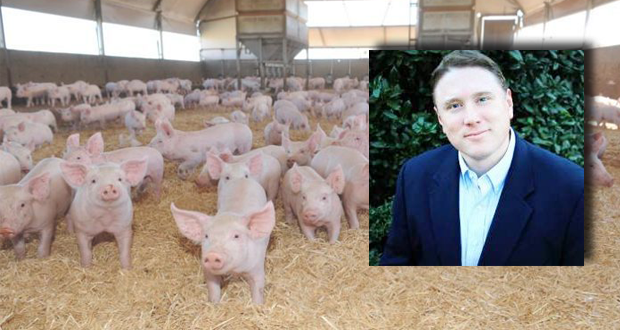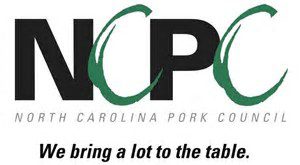It’s Easy to Be Excited About Your Work When You Work for Good People
From the Corner Office: Andy Curliss, North Carolina Pork Council

This month, Association Adviser sat down with Andy Curliss, chief executive officer of the North Carolina Pork Council (NCPC), to chat about a job he was tapped for in November 2016 after 20 years of working as an investigative reporter and editor for The News & Observer (Raleigh) and as a division head for Gelia, Wells & Mohr, Inc., a communications agency.
Andy spoke with us about transitioning into association management from a background in journalism and communications, how he’s balancing work with earning a master in business administration, and the importance of being passionate about your industry’s mission if you want to be successful at association work.
Association Adviser: You were tapped to be the CEO of NCPC in November 2016. How is the new job going?

Andy Curliss: It’s wonderful. What I get to do every day is represent farmers and producers who care about animals and the environment, and who give us a great product – pork – that everybody loves. Well, mostly everybody. So it’s a wonderful opportunity, and I’m grateful for it.
AA: You have some experience reporting on agriculture. Did that draw you to this job?
AC: I spent most of 2014 following the production process, or the journey of a pig, if you will, from insemination to the plate. I spent time on farms, in packing plants, and even traveled to Japan to follow a pig from farm to the chopsticks. It was fascinating to observe and talk with customers in Tokyo after getting to know the farmers from eastern North Carolina who produce a product that is beloved by the Japanese. During that year of reporting, I came to intimately understand and know people in the pork business. I published a fairly significant four-part series about the pork industry that touched on everything from breeding and feeding, to exports, the economics of the industry, and where things were heading with the state’s agriculture and food industries. Then I moved on to other topics. But I did get to know people in the pork industry through that project.
Later, I was the state government editor at The News & Observer before leaving the paper to work for Gelia, Wells & Mohr, Inc., a communications agency with a worldwide clientele. I launched Gelia’s public affairs division. My division brought marketing to the intersection of business, government and education. I worked closely with clients in pork and agribusiness while I was at Gelia. My pork clients were in the Midwest and in North Carolina. I worked with those on the farming operations side as well as in the processing side.
Then in late 2016, I was approached by the search committee of NCPC when their CEO announced she would be leaving. They asked me if I would be interested, and that led to my hiring.
AA: Did this help you land your job?
 AC: My familiarity with the issues and interests in the pork industry helped, but it was mainly my skills, background and experience that made me the right fit for NCPC. But knowing the industry’s background helped me transition more smoothly into the job.
AC: My familiarity with the issues and interests in the pork industry helped, but it was mainly my skills, background and experience that made me the right fit for NCPC. But knowing the industry’s background helped me transition more smoothly into the job.
AA: What journalism/communications skills have been most valuable in your new role?
AC: There are two key facets to my role with NCPC: One is communications and the other is public policy. Some association management positions have much more of a fundraising component to them. The emphasis in my role is on communications and public policy. My background matches up with those two.
Writing, public relations, marketing, advocating – I use all of those skills on a daily basis. I also work on content creation and incorporating social media into NCPC’s operations. One of the things I’m emphasizing is that we need to create our own content and not depend on others to tell our story. This emphasis puts us into the realm of being a publisher. So really, it’s hard to pinpoint just one.
It’s worth noting that I don’t have a farming background. However, my in-laws owned a grocery store and my father-in-law was a butcher who then later sold fresh pork for more than two decades, so I’ve been around that aspect for a while.
AA: What approaches are you taking to creating more owned media?
AC: We’re creating more of our content in house so we can expand upon the amount of owned media we have to educate and advocate about the pork industry. We’re also shifting staff responsibilities to focus more on content creation. We had a vacancy in a communications position and we refocused that position into more of a content creator versus a promotions or marketing/branding position. This week we were out in the field making our own videos, for example.
Creating content in-house allows us to be more nimble, more budget-conscious and more active in our content creation process.
 AA: What has surprised you the most about working in association management?
AA: What has surprised you the most about working in association management?
AC: I don’t know that I’ve been surprised by anything. I was an investigative reporter for many years, so I am used to doing my homework. I knew what I was coming into. It helps to have a great team in place, which was certainly the case here at the Pork Council. I can’t say I’ve been surprised by the work, and that goes back, in part, to my preparation and understanding of the industry before I joined the pork council. I’m used to managing several responsibilities and projects at once.
AA: You’re also working on an MBA. What was your motivation to earn an advanced degree at this point in your career?
AC: When I left journalism and was with Gelia, all my clients were CEOs. I was at a communications agency but I was matched with people in the C-suite. I wanted to gain valuable professional knowledge that I didn’t have, and so it became clear to me that the best way was to go back to school.
AA: How’s it going balancing coursework and job?
AC: The program I am in at East Carolina University is both accessible and high quality. There has been something from every single course that I’ve been able to apply to my job nearly every week I’ve been in it. It’s good to be in a learning environment. I’ve been a lifelong learner, so I like that aspect.
AA: What advice would you give to someone wanting to begin a career in association management, or to someone who wants to advance in association management?
AC: Have a service mindset. You have to be genuinely interested in serving the membership of whatever industry your association serves, and have a passion for the mission of the people you’re going to work for. You can’t just be looking for a job – that’s not going to serve the membership. It must be more.
A Successful Association Career Means Having a Service Mindset – Andy Curliss
Anyone who’s looking to make a transition into association work should focus on the mission of the association and how they can serve it.
AA: What gets you excited to go to work every day?
AC: My job is about serving the people I work for. Farmers are good people, and it’s easy to be excited about representing and advocating for their interests.
Andy Curliss is the CEO of the North Carolina Pork Council, a statewide organization chartered in 1962 to support producers and allied industry partners within the $11 billion North Carolina pork industry. He has previously worked for Gelia, Wells & Mohr, Inc., and The News & Observer Publishing Company. Reach him at [email protected].

